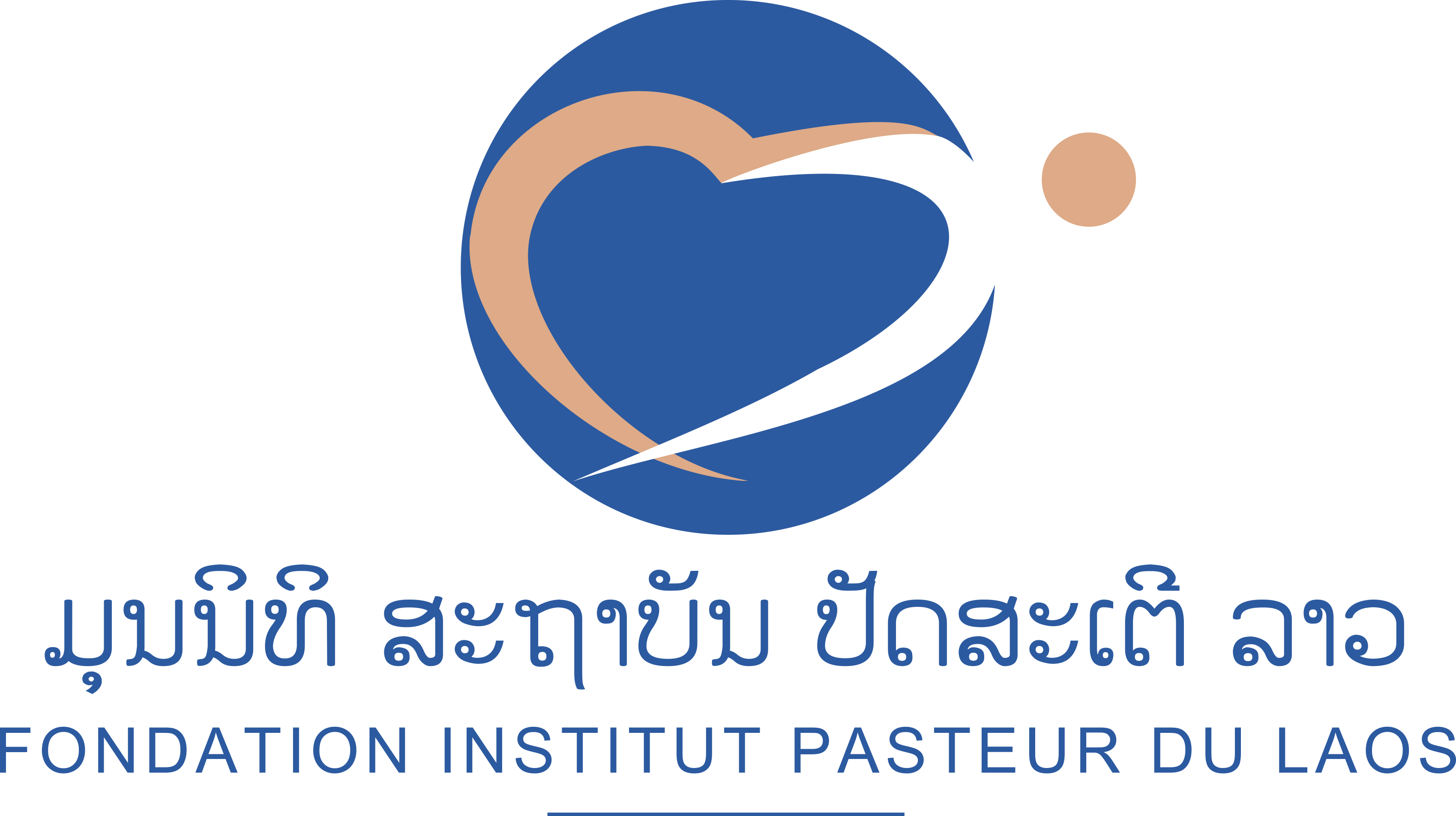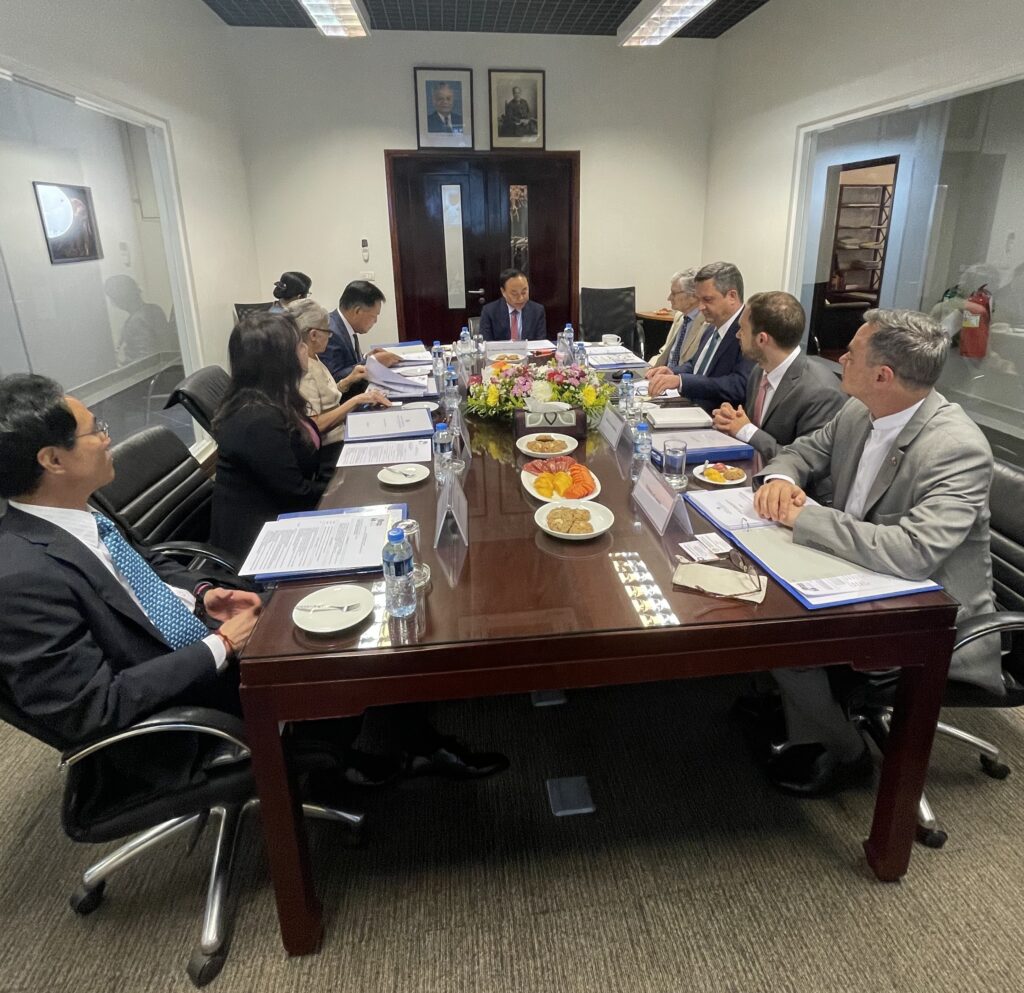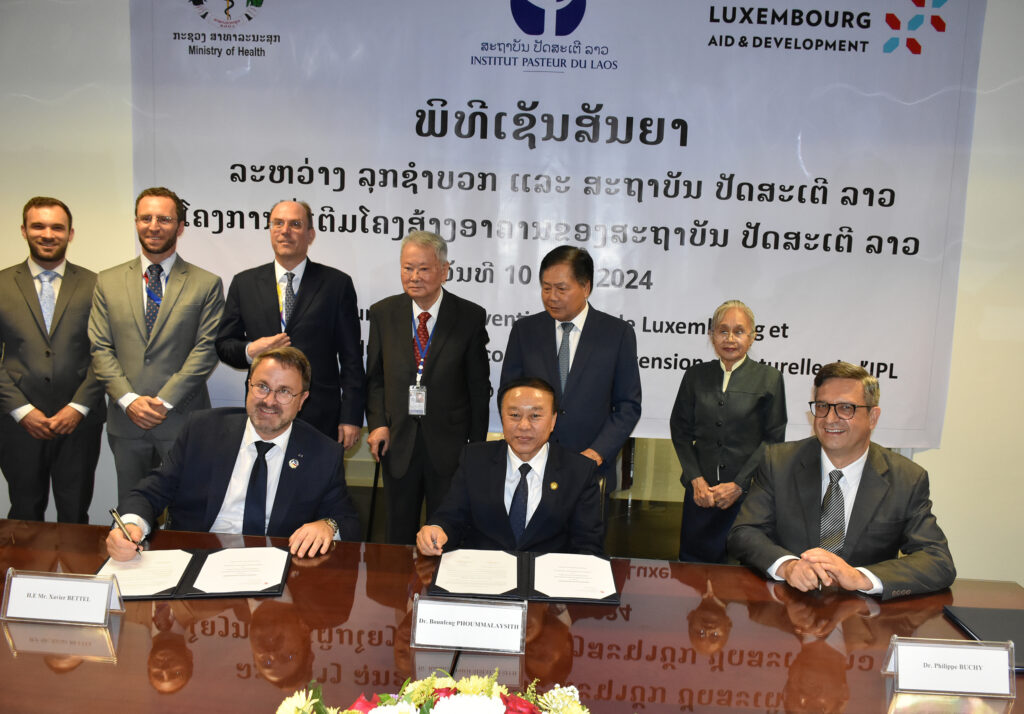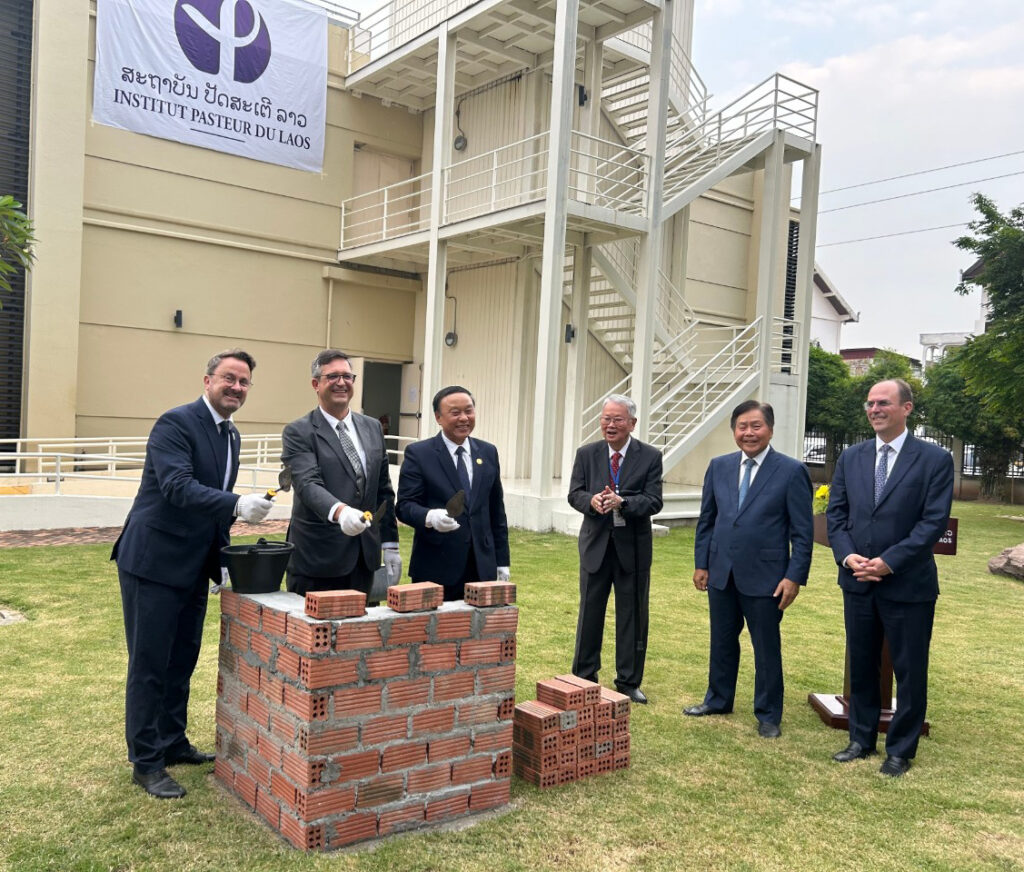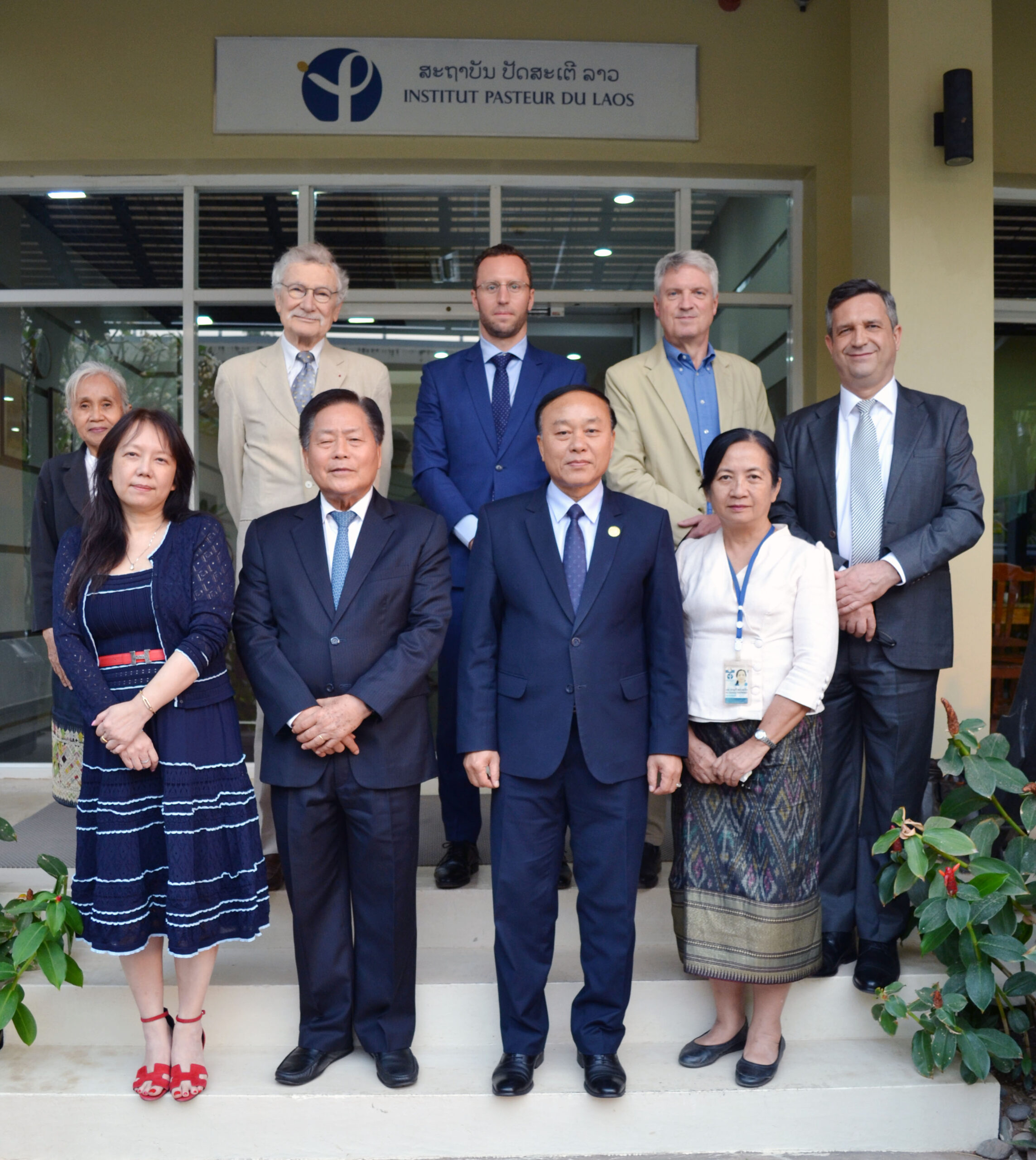COVID-19 surveillance in Laos
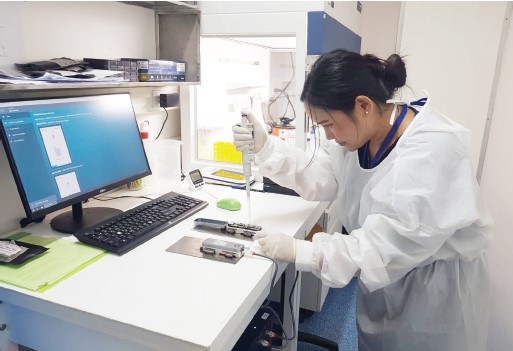 Collaborations.
Collaborations.
Setthathirah Hospital, Vientiane Capital, Lao PDR.
Children’s Hospital, Vientiane Capital, Lao PDR.
National Centre for Laboratory and Epidemiology (NCLE), Ministry of Health, Lao PDR.
Department of Communicable Diseases Control (DCDC), Ministry of Health, Lao PDR.
Funding.
Agence Française du Développement (AFD, Ecomore2 TOP-UP project).
National Center for Global Health and Medicine, Tokyo, Japan.
Objectives.
The main objectives of IPL’s COVID-19 surveillance are to perform COVID-19 diagnosis for 2 hospitals in Vientiane and to generate sequence data on the SARSCoV- 2 strains shared by the NCLE in order to provide to the Lao MOH data on the circulation of SARS-CoV-2 variants within Laos as part of the pandemic control strategy.
Background.
After the emergence of the Severe Acute Respiratory Syndrome – Coronavirus 2 (SARS-CoV-2) virus in the city of Wuhan in China at the end of 2019, which led to the COVID-19 (Coronavirus Disease 19) pandemic, the Institut Pasteur du Laos (IPL) was requested by the Ministry of Health (MOH) to contribute to the national pandemic response. As a consequence, since March 2020, IPL has been one of the frontline laboratories for the diagnosis of SARS-CoV-2 in the country. Since April 2021, IPL has started the surveillance of SARS-CoV-2 variants circulation by Sanger sequencing and RT-PCR screening. In November 2022, IPL implemented a new next generation sequencing (NGS) method to obtain the full-length genome sequences of SARS-CoV-2 variants.
Methodology.
Samples.
Respiratory samples tested at IPL for COVID-19 diagnosis purpose mainly originated from Setthathirah and Children hospitals from Vientiane Capital. Samples tested at IPL for SARS-CoV-2 variants surveillance were i) selected among the stains detected during the diagnosis activities and ii) selected by NCLE among the strains identified by the national surveillance.
RT-PCR testing of SARS-CoV-2.
Since early 2023, samples sent to IPL for COVID-19 diagnosis were tested by Xpress SARS-COV-2 Plus cartridge on GeneXpert (Cepheid) according to the manufacturer’s instruction. When more than 4 samples per day were received for diagnosis purposes and for all the samples selected by NCLE for variants surveillance, RNA was extracted from clinical specimens by NucleOspin RNA virus kit (Macherey-Nagel); NucleOspin 8 virus kit (Macherey-Nagel) or Nucleic Acid Extraction Rapid kit (Bioperfectus) according to the manufacturer’s instructions. Extracted RNAs were then screened for the detection of SARS-CoV-2 genome by RT-PCR following the Charité-Berlin protocol (Corman et al. 2020).
Next Generation sequencing.
At the end of 2022, IPL established a highly multiplexed PCR amplicons approach using the ARTIC Network multiplex PCR primers sets (https://artic.network/ncov- 2019) with the Oxford Nanopore MinION technology (Quick et al. 2017; Itokawa et al. 2020). Samples were multiplexed using Oxford Nanopore rapid barcode and run in batches of 4-24 on a single flow cell. Base calling was performed on MinKNOW software. The consensus sequences were then obtained using the EDGE pipeline (Li et al. 2017). Lineages and specific mutations were determined from consensus sequences using Nextclade (https://clades.nextstrain.org/) and PANGOLIN (https:// pangolin.cog-uk.io/) webservers. Complete genomes of SARS-CoV-2 virus generated by IPL were submitted to GISAID (Elbe et Buckland-Merrett 2017).
Results.
COVID-19 diagnosis at IPL.
Between 1st January and 29th October 2023 (week 43), 289 samples were tested at IPL and 60 (20.76%) were positive. The number of samples received monthly varied from 6 to 100, with a peak in July 2023 (Figure 7). Samples were coming mostly from Children’s hospital (n=138) and Setthathirath Hospital (n=90).
Surveillance of SARS-CoV-2 variants.
Since early 2023, 273 full-length genome sequences of SARS-CoV-2 were generated at IPL. More than 80% of the strains analyzed were obtained from clinical samples sent by NCLE (n=223) and the remaining ones (n=50) corresponded to samples that tested positive at IPL. In January and February 2023, the Omicron sub-variant BA.2.75 was the most frequently detected variant (37 out of 44 strains analyzed). The Omicron recombinant variant XBB.1 was first detected at the beginning of January 2023 and became predominant after a few months. Since May 2023, mainly Omicron recombinant variants (XBB) were detected (226/228). Among them, sub-variant XBB.1.16 was the most prevalent one (n=136), followed by XBB.1.9 (n=64) which could be further categorized into various sub-variants: EG.5.1 (n=37), XBB.2.3 (n=11), XBB.1.22 (n=10), XBB.1.5 (n=5) and XBL (n=1).
Discussion.
Since the beginning of the year 2023, the number of samples submitted to IPL for COVID-19 diagnosis is lower compared to the previous years. Indeed, between 1st January and 29th October 2023 (week 43), only 289 samples were received by IPL and SARS-COV-2 was found in 60 of them (20.76%). By comparison in 2020, 2021 and 2022, the number of samples tested at IPL reached 2 516, 57 512 and 18 163, respectively.
Since the beginning of 2023, 273 full-length genome sequences of SARS-CoV-2 were generated at IPL. The dynamics of SARS-CoV-2 variants identified in Laos were similar to what was observed in the neighboring countries with the introduction of Omicron recombinant variant XBB at the end of 2022 or the beginning of 2023 (https://outbreak.info/).
Conclusion & perspectives.
In 2023, only a few positive cases of COVID-19 have been identified among our samples reflecting the reduction of this disease burden in Laos. As a consequence, IPL will end the COVID-19 diagnosis activities in 2024. All RT-PCR results were shared with NCLE and DCDC on a daily basis. NCLE consolidated testing data from all laboratories and reported aggregate data to the MOH.
In 2023, IPL shared the SARS-CoV-2 variants surveillance reports with NCLE, WHO and all partner laboratories by email and then via a virtual database accessible by various partners. IPL also submitted the sequences obtained by NGS on the GISAID database (https://www.gisaid. org/). These results allowed the accurate identification of the circulating variants present in Laos which is very important for the pandemic control strategy established by MOH. IPL will maintain in 2024 the sequence analysis activity that supports the monitoring of SARS-CoV-2 variants in Lao PDR.
References.
Corman, Victor M., Olfert Landt, Marco Kaiser, Richard Molenkamp, Adam Meijer, Daniel Kw Chu, Tobias Bleicker, et al. 2020. « Detection of 2019 Novel Coronavirus (2019-nCoV) by Real-Time RT-PCR ». Euro Surveillance: Bulletin Europeen Sur Les Maladies Transmissibles = European Communicable Disease Bulletin 25 (3): 2000045. https://doi.org/10.2807/1560- 7917.ES.2020.25.3.2000045.
Elbe, Stefan, et Gemma Buckland-Merrett. 2017. « Data, Disease and Diplomacy: GISAID’s Innovative Contribution to Global Health ». Global Challenges (Hoboken, NJ) 1 (1): 33‑46. https://doi.org/10.1002/ gch2.1018.
Itokawa, Kentaro, Tsuyoshi Sekizuka, Masanori Hashino, Rina Tanaka, et Makoto Kuroda. 2020. « A Proposal of Alternative Primers for the ARTIC Network’s Multiplex PCR to Improve Coverage of SARSCoV- 2 Genome Sequencing ». bioRxiv. https://doi. org/10.1101/2020.03.10.985150.
Li, Po-E., Chien-Chi Lo, Joseph J. Anderson, Karen W. Davenport, Kimberly A. Bishop-Lilly, Yan Xu, Sanaa Ahmed, Shihai Feng, Vishwesh P. Mokashi, et Patrick S. G. Chain. 2017. « Enabling the Democratization of the Genomics Revolution with a Fully Integrated Web-Based Bioinformatics Platform ». Nucleic Acids Research 45 (1): 67‑80. https://doi.org/10.1093/nar/gkw1027.
Quick, Joshua, Nathan D Grubaugh, Steven T Pullan, Ingra M Claro, Andrew D Smith, Karthik Gangavarapu, Glenn Oliveira, et al. 2017. « Multiplex PCR method for MinION and Illumina sequencing of Zika and other virus genomes directly from clinical samples ». Nature Protocols 12 (6): 1261‑76. https://doi.org/10.1038/ nprot.2017.066.
Publications in 2023.
Elodie Calvez, Elliott F. Miot, Sitsana Keosenhom, Vaekey Vungkyly, Souksakhone Viengphouthong, Phaithong Bounmany, Paul T. Brey, Sébastien Marcombe, Marc Grandadam. Low Transmission of Chikungunya Virus by Aedes aegypti from Vientiane Capital, Lao PDR. Pathogens 2023; 12: 31. https:// doi.org/10.3390/ pathogens12010031.
Gabriel Luz Wallau, Global Arbovirus Researchers United (Cécile Troupin and Philippe Buchy are part of the GARU consortium). Arbovirus researchers unite: expanding genomic surveillance for an urgent global need. Lancet Glob Health 2023 Oct;11(10):e1501-e1502. doi: 10.1016/ S2214-109X(23)00325-X.
Congress and workshop.
Oral presentations.
Report on the joint COVID-19 EQA of Laos implemented by the Project with the cooperation of NIID Japan, Project closing seminar of “the project for capacity development for medical laboratory network on biosafety and examination of highly hazardous infectious pathogens in Vietnam, Laos and Cambodia (JICA-NIHE phase 3 project)”; 10th February 2023, Hanoi, Vietnam, (online presentation: Cécile Troupin).
Arboviruses surveillance at Institut Pasteur du Laos from 2020 to 2022; 10th European Meeting on Viral Zoonosis, 23rd-26th September 2023, Saint-Raphael, France (Cécile Troupin).
Posters.
Implementation of Rabies activities at Institut Pasteur du Laos; 10th European Meeting on Viral Zoonosis, 23rd-26th September 2023, Saint-Raphael, France (Cécile Troupin).
Congress and workshop attendance.
Annual Laboratory network and external quality assessment (EQA) Meeting, 10th-12th January 2023, Crown Plaza Hotel, Vientiane Capital, Lao PDR (Thonglakhone Xaybounsou).
Tabletop exercise to test pandemic influenza preparedness and response, 31st January 2023, Landmark Hotel, Vientiane Capital, Lao PDR (Thonglakhone Xaybounsou).
4th lesson learned meeting of an arthropod-born disease surveillance network in military hospitals through Arboshield Project, 9-10th February 2023, Crown Plaza Hotel, Vientiane Capital, Lao PDR (Thonglakhone Xaybounsou, Cécile Troupin).
Project closing seminar of “the project for capacity development for medical laboratory network on biosafety and examination of highly hazardous infectious pathogens in Vietnam, Laos and Cambodia (JICA-NIHE phase 3 project)”; 10th February 2023, Hanoi, Vietnam, (online attendance: Thonglakhone Xaybounsou, Cécile Troupin).
Annual review on implementation of the national work for health security and state party annual reporting (eSPAR) and country consultation for a new bioregional Asia Pacific Health Security Action Framework (AP-HSAF), 6th-8th March 2023, Luangprabang, Luang Prabang province, Lao PDR (Thonglakhone Xaybounsou).
Virtual workshop on Child Health – Pasteur Network; 14th March 2023 (online attendance: Cécile Troupin).
Rabies in Pasteur Network, 27th April 2023, online workshop organized by Pasteur Network Rabies Working Group (PN-RWG) (Cécile Troupin as member of PNRWG).
Reviewing the implementation of surveillance, Risk assessment and response in Lao PDR, 24-26th May 2023, Don Chan Palace, Vientiane Capital, Lao PDR (Thonglakhone Xaybounsou).
Review national policy and strategies on Neglected Tropical disease prevention and control, 5-6th June and 13-14th July 2023, Vang Vieng, Vientiane province. (Thonglakhone Xaybounsou).
ECOMORE 2 project Final Meeting, 28th-30th June 2023, Phnom Penh, Cambodia (Thonglakhone Xaybounsou, Cécile Troupin).
Dengue case management collaborates with WHO, 6th July and 11th August 2023, at the Department of Healthcare and Rehabilitation (DHR), Vientiane Capital, Lao PDR, (Thonglakhone Xaybounsou).
Rabies surveillance in Lao PDR with WHO, NAHL, DCDC, 31st July 2023, at NCLE, Vientiane Capital, Lao PDR, (Thonglakhone Xaybounsou, Cécile Troupin).
10th European Meeting on Viral Zoonosis, 23rd-26th September 2023, Saint-Raphael, France (Cécile Troupin).
Consultation meeting on rabies community-based surveillance system in Lao PDR, 10th-11th October 2023, Lao Plaza, Vientiane, Lao PDR (Cécile Troupin).
Teaching activities
“Specimens Packing and transportation” for military medical personnel following Field Epidemiology Training (5th FET short course), 27th February 2023, at Lao TPHI (organized by IPL in the framework of Arboshield Plus project) (Thonglakhone Xaybounsou).
“COVID-19 and Dengue Diagnostics & Lab technique management training”, on-job training for military trainees, March 2023 at IPL, (organized by IPL in the framework of Arboshield Plus project), (Thonglakhone Xaybounsou).
“Specimens Packing and transportation (including IATA)” for military personnel attending the training module on Biosafety and Biosecurity (ToT on Biosafety, module 2), 15th & 30th March 2023, at IPL (organized by IPL in the framework of Arboshield Plus project) (Thonglakhone Xaybounsou).
Rabies MOOC in Pasteur Network, as coordinator of the online course available on the FUN platform (https://www. fun-mooc.fr/en/courses/rabies/); (Cécile Troupin).

